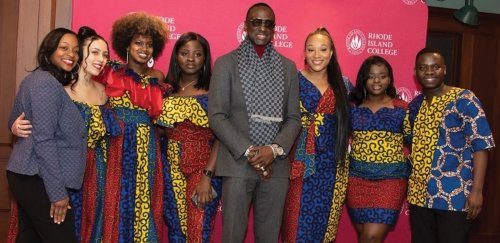
Harambee, which in Kiswahili means “unity” or “stand together,” is the name of Rhode Island College 's multicultural student organization.
The African diaspora consists of the worldwide collection of communities descended from native Africans or people from Africa, predominantly in the Americas, where the most populated countries in the African diaspora includes Brazil, Colombia, the United States, the Dominican Republic, and Haiti.
Harambee, which in Kiswahili means “unity” or “stand together,” is the name of Rhode Island College’s multicultural student organization. The club is the black students’ union on campus, which strives to represent the African diaspora. Its members primarily consist of students from the African American, Afro Caribbean, and Continental African diaspora; it also welcomes others from diverse cultural backgrounds.
“Harambee was started back in 1978 by a couple of students who were the voices of the many. They wanted to come together to really center that purpose and encourage others to join the fight. They got together, went in front of Student Community Government, and centered what they believed in,” says Jayana Greene, former vice-president of Harambee.
Today Harambee continues this legacy, working toward the same purpose it has stood for since its beginnings: countering racism and the type of macroaggressions that were more common back then.
“It was more of a presence on campus, where people of color and minority students just didn’t feel represented,” Greene explains. “Harambee essentially created a safe place for them to express whatever issues they were dealing with – as well as to just come together and be able to say, ‘I have friends who look like me and I connect to people who resonate to other people who look like me.’”
Now, 43 years later, Harambee’s members are from the Congo, Haiti, the Dominican Republic, Ghana, Nigeria, Liberia, Jamaica, Barbados, Kenya, and the Philippines.
Brooxana Pierre, the vice president of Harambee, explains that at every meeting they encourage everybody to learn about each other’s different cultures and traditions. “We bring different topics and everybody is able to share their experience and relate with each other,” she says. “When we share our experiences, I feel that’s how we learn how similar we are, but how beautifully different as well.”
Harambee sees Black History Month as a time to celebrate unity. “I think unity now more than ever, is not just a black issue but it’s a human rights issue,” Greene says. “It’s an all of us issue and now more organizations and people are beginning to recognize that, and joining us in Black History Month celebrations. It’s not just, ‘Harambee presents'! All of the other divisions of RIC are coming together to celebrate.”
“For Black History Month, we’re doing some events online,” Pierre explains. “We are hosting an event where we are inviting Rhode Island State Representative, Brianna Henries to speak on the current events of our world, a mental health event, a talent showcase, and some historical events as well. It is all just coming together.”
Pierre also notes that Harambee understands that there are students on campus who don’t feel represented, who feel like an outcast. “Often times as black people we are put under this ‘every black person is the same’ umbrella, when we are in fact all unique in our own way.” She continues, “our cultures have beautiful differences that deserve to be highlighted and represented. As e-board members of a multicultural organization we refuse to encourage that every black person is the same narrative.”
This is important because the African diaspora is often view and treated as if everyone were from the same place, with the same cultural background or ethnicity. “Sometimes people just think of black people as one type, but there are so many different dialects, languages, cultures. Just in Africa there are more than 50 countries. All of it needs to be celebrated,” says Greene. “It’s unique how each of us are and how we come together to form a beautiful race of people. There’s not just one black ethnicity, but a multitude of variations. We are not all the same; we definitely are different.”
Greene believes these differences highlight the need for requiring a diversity and inclusion course at the beginning of college. “That is important, especially on a college campus. There are so many different identities and cultures that coming to RIC is a shock for some people,” she says. “I think that it would be great to make it a requirement and have students educated on diversity and inclusion, what that really looks like and how to understand it, so when they go out into the workforce, they go out with some sort of knowledge of these topics.”
“I feel we are essentially having a break-through,” Greene concludes. “Kamala Harris just became the first black woman to serve as vice president, and I feel that there’s more to come. People are beginning to listen. They’re willing to learn and understand my struggle. Although you may not empathize with me, you sympathize with me. People want to become culturally aware of what you say, how you say it, and the intentions and meaning behind it.”
